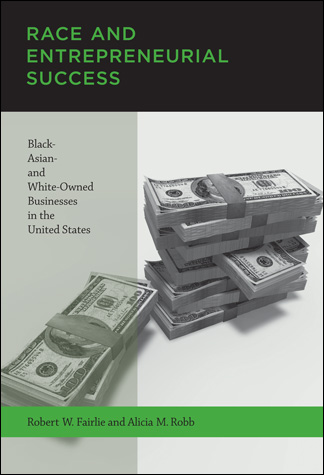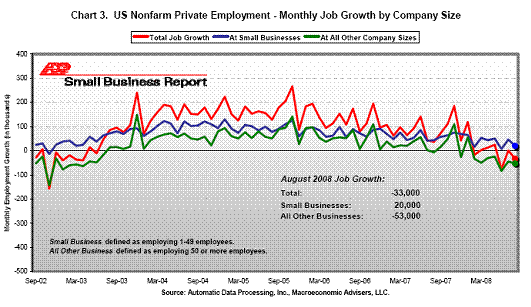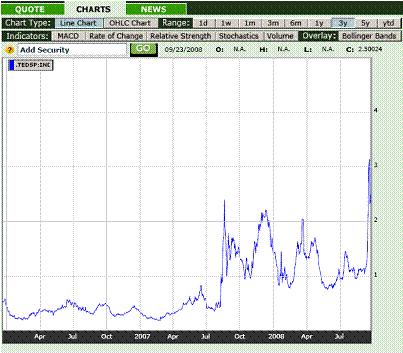Most of the discussion surrounding the current crisis has focused on the implications for major businesses and their hiring and investment decisions, or households and their employment possibilities, or consumer behavior. One overlooked (or underemphasized) aspect of the issue is the impact on small firms. Fortunately, my former colleague (and coauthor), Rob Fairlie has just published a book that can inform one’s thinking on this subject.

In Race and Entrepreneurial Success:
Black-, Asian-, and White-Owned Businesses in the United States (MIT Press),
Fairlie and coauthor Alicia Robb investigate examine racial disparities in business performance, drawing on a rarely used, restricted-access dataset compiled by the U.S. Census Bureau. They also explore the broader question of why some entrepreneurs are successful and others aren’t.
From the introduction:
…
Estimates from the [Characteristics of Business Owners] CBO [dataset] indicate a strong positive relationship between
startup capital and business outcomes. Firms with higher levels
of startup capital are less likely to close and are more likely to have higher profits and sales and to hire employees. The estimated positive relationship is consistent with the inability of some entrepreneurs to obtain the optimal level of startup capital because of liquidity constraints.
Overall, our findings indicate that large racial disparities exist in
business ownership and business outcomes in the United States. There
is also no evidence suggesting that these patterns will disappear in the near future. Our analysis of the confidential and restricted-access CBO reveals several important determinants of success in small business ownership. The analysis focuses on the business and owner characteristics that are likely to be the most important inputs into the firm’s production process as suggested by economic theory. In addition to more traditional explanations, such as the owner’s education level and access to financial capital, we find evidence suggesting that familybusiness backgrounds are important. In particular, prior work experience in a family business has a positive effect on business outcomes, possibly through the acquisition of specific and general business human capital.
Turning to explanations for disparities in business outcomes, we
find that racial differences in these factors are important. The relative lack of success among black-owned businesses is attributable in part to owners who have less startup capital, disadvantaged family backgrounds, and less education. Conversely, the relative success of Asian American-owned businesses in the United States appears to be mainly due to their relatively high levels of startup capital and owner’s education.
How will the financial crisis/credit crunch affect small firms? This question of course is not dealt with in the book, but to the extent that small firms more constrained by the “pecking order”/financing hierarchy for capital [0], they should be hit hardest (i.e., they have the least access to retained earnings, and have to rely most on bank credit as opposed to capital markets). And of course for new firms, startup capital will be even harder to access.
Interestingly, the fact that black-owned firms have the least access to credit currently means that they might be least affected negatively by this aspect of the current crisis. On the other hand, to the extent that these firms also tend to be the least capitalized (the white- and Asian-owned ones are the most), they will still probably suffer the most as the recession sours (yes, I am of the view that the “fundamentals” are not altogether that strong [1]).
One point Fairlie has pointed out to me is that the drop in housing prices (see this post for prospects) is going to be a big hit to entrepreneurship. He observes that home equity represents the largest source of net worth and is often used as collateral or direct equity investment in businesses.
All this is extremely important, given that small firms have been generating jobs on net, in contrast to the rest of the economy. From the ADP National Employment Report [pdf]:

Figure 1: Chart 7 from ADP National Employment Report for August 2008.
For more insight into small business owners current views on prospects, see this.
So, today, I am in (rare) agreement with the President’s assessment of what would happen in the absence of some sort of government intervention in the financial system:
The government’s top economic experts warn that without immediate action by Congress, America could slip into a financial panic, and a distressing scenario would unfold:
More banks could fail, including some in your community. The stock market would drop even more, which would reduce the value of your retirement account. The value of your home could plummet. Foreclosures would rise dramatically. And if you own a business or a farm, you would find it harder and more expensive to get credit. More businesses would close their doors, and millions of Americans could lose their jobs. Even if you have good credit history, it would be more difficult for you to get the loans you need to buy a car or send your children to college. And ultimately, our country could experience a long and painful recession.
But even if the plan solves the problem of a frozen system of credit, the long term prospects will still be grim, insofar as we face a long period of deleveraging.
parting shot: Here is the TED spread as of today.

Figure 2: TED spread, accessed from Bloomberg.
Small business owners can and should rise above all obstacles to top performance in the macro environment. The Internet brings professional Business Management to all door-steps. This is a great time for enterprises to stand apart from the general malaise in the U.S. economy.
Yeah, I suppose this recession could ultimately accentuate income disparities brought about by information technologies- and freer trade-driven growth. America already seemed rather grumpy and could get grumpier.
On a more pleasant subject….. Does the TED spread provide any kind of useful growth prediction?
Yes, government wedges do create difficulties for entrepreneurs and those wedges are higher today than they have ever been. For example to file for a DBA (fictitious business name) may take 5 days, then a business license takes 8 days, on the internet getting a federal tax id may only take one day but by mail may take 14 days, a state tax id normally requires 8 days, and a sellers permit may take 10 days.
What I have listed are estimated times from a company whose business is to help startup small businesses. Granted some of these may be done simultaneously but most are linear. That means that, for a business to comply with the law, a simply business license requires 45 days and will cost around $3,000.
Then we must consider that if you are a specialty business or you have special construction or improvements permits and inspections increase both the time and the money required. Most small businessmen especially minorities cannot afford the time from their normal work to run this gauntlet. Government wedges more than anything create and expand the underground economy. For example less than 10% of street vendors in New York City have a license, and in any large city unlicensed minority businesses are as common as those that are licensed. Hernando de Soto has demonstrated this in a powerful way in his studies in South America showing that governments actually lose revenue by forcing small businesses into the underground economy. A small reduction in these wedges can have a huge impact on encouraging compliance with legal requirements and increases in tax revenue.
So the primary problem for small businesses in both time and money is a prohibitive governmental system that discourages the entrepreneur. Our system has actually been engineered by big businesses to keep out competition. An existing business can expand with lower cost and time than someone new to the business, so, if the governmental costs of starting a new business are kept high, existing businesses can easily keep out the competition.
During the Great Depression the legal entrepreneur was virtually wiped out. The result was economic stagnation and wasted resources as illegal businesses had to hide from and/or bribe authorities to stay in business.
If we want to help the minority entrepreneur we should reduce the governmental wedges designed to hinder the small entrepreneur. As usual government creates the problem.
Interesting any longitudinal showing relative success pre-during and post recession.
My guess having started up just after recession when rents and other costs were relatively low is that there are more successful (open more years) start ups during and post recession than before, even though they may be less started (but that makes competition fiercer.)
Some of my neighbours shut down because costs simply became too high when everyone and their dog was trying to get in.
In terms of capital, when I started I needed maybe 70% less than I would need at todays neigbouring rates to get going.
Whne I started we used family money begged and borrowed, not a cent from a house. Anecdotally most young guys I know were more interested in property speculation than business in tghe last couple of years. Hey but thtas a business too I guess.
The meme about small firms creating jobs is one of the most misleading claims in economics. Yes, small firms do create more jobs than large firms.
But they also destroy more jobs. The consequence is that the share or distribution of jobs between small and large firms has actually declined in recent years. In 1988 small firms accounted for 54.5% of employment. this fell to 49.9 in 2001 before rebounding to 51.2% in 2005.
See the special Census-SBA study at http://www.census.gov/csd/susb/susbdyn.htm
Menzie,
Good on you to agree with Bush. We must not be blinded by the greed that caused this (Thatcher, Reaganomics, Wall Street, Friedman, Clinton and then finally Bush) Why should Bush or Republicans be soley held responsible – there is a long line of promoters of free and unfettered markets.
That this requires a turn towards Keynes and more intervenionist policies in future (Obama or McCain?) there is no doubt (call them traditional Deomcrat policies if you will but we will need ’em).
However, right now. At this very moment. While the street is on “fire”. We surely need to stop bickering and laying blame and to wholeheartedly support the mother of all bailouts (as despicable as it is). Sure it will be grim but if taxpayers do not stand behind their errant profligerate spending financial “whiz kids” who totalled the Mustang then it will get a whole lot worse than just “grim”!
I would like to see what you experts think would happen under a total widespread failure of banking and a run on the banks globally. Don’t you experts have some kind of modelling you could run – what would happen if “trust” breaks down completey? How much trade or money flow is not actual cash or bullion – you know the M1 M2 money supply stuff, which is hard to graps for a layman?
Question: what exactly will the Mother of All Bailouts do for the commercial paper market? Or to relieve the kinds of ‘stress’ we see in the TED spread?
Comment: actually, could we all stop using metaphors here? Financial industry jargon like ‘stress’, ‘liquidity’, etc. conceal more than they reveal at least to me. It would be better to say, I think, that “money market funds are refusing to purchase commercial paper from corporate borrowers except at rates that will undercut the profitability of those borrowers.” That may not be accurate as a statement, but by avoiding metaphor I think it would communicate a good deal more than saying “the markets are stressed.”
Anon: There is no such thing as ‘greed’, just ‘self-interest’, some more socially productive than others.
Herr von Blowhard: Good point. But I do like the President Paulson metaphor. It has all the useful characteristics of a sufficient metaphor.
What would happen to the TED spread if lenders started to doubt the Treasury could repay its debt? I wonder if we will find out?
Thanks Menzie! The TED chart is excellent, and shows how the Eurodollar market is starting to unravel with the GSE, AIG & Lehman derivitive settlements. As M3 (Eurodollars) expanded with derivative growth, M3 will contract as derivatives decline. High Libor rates will also affect ARM Resets, increasing mortgage failure.
I would appreciate a discussion about HOW the various Treasury Bailout Plans are structured, and WHY any of the plans are anticipated to work.
Thanks again for the Econobrowser.